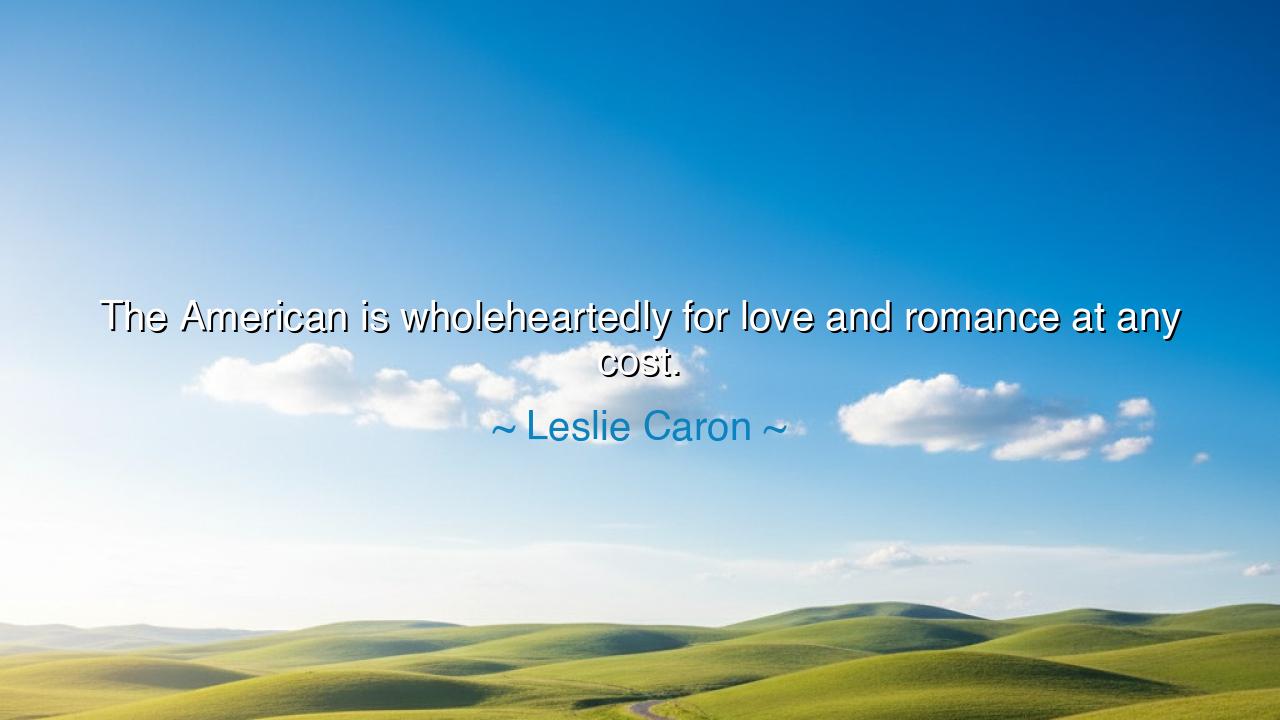
The American is wholeheartedly for love and romance at any cost.






The words of Leslie Caron, spoken with both wonder and observation, cut to the heart of a nation’s spirit: “The American is wholeheartedly for love and romance at any cost.” In this phrase, we glimpse not merely a cultural note, but a declaration of the boldness of the human heart when it refuses to be tamed. To say “at any cost” is to speak of passion that leaps beyond calculation, a fire that consumes hesitation, a devotion that does not bow to practicality. It is the spirit of risk, of daring, of love pursued as though it were life itself.
The ancients knew such recklessness of the heart. They told stories of lovers who defied kings, laws, and even gods in pursuit of one another. What Leslie Caron attributes to the American spirit is in truth a quality that has lived in all peoples, but here, she names it in the character of a nation built on boldness and unrelenting dreams. For America, born of rebellion and adventure, carries within its veins a refusal to accept limitation. To apply this to love is to say: here is a people who will leap without counting the cost, for they believe that the reward—love and romance—is worth the peril of the fall.
Consider the tale of Pocahontas and John Smith, a story interwoven with history and legend. Though their love was contested by cultures, boundaries, and the threats of war, it symbolized the power of the heart to cross divides thought unbridgeable. Whether embellished or stripped to its truth, the tale has endured because it captures that same reckless courage: the willingness to embrace romance in defiance of consequence. It is this same spirit Caron names, a love pursued without measure, without restraint.
Yet there is danger in this as well as beauty. To love at any cost is to risk heartbreak, ruin, or folly. It may lead the soul into sorrow, for not all romances end in joy. But is this not the essence of what makes love glorious? To enter into it with full knowledge that one may suffer, and yet to enter anyway, is the very mark of courage. The soldier who marches into battle does not demand assurance of victory; he marches because the cause is worthy. So too with love: one must be willing to sacrifice comfort, safety, and sometimes even reputation, for the sake of the flame.
There is also humility in these words. For romance is not a possession to be controlled but a force to be yielded to. The American, in Caron’s eyes, embraces this surrender. To chase love is to admit vulnerability, to confess a hunger that cannot be ignored. And in a world that prizes strength and independence, this act of surrender is itself heroic. The ancients would say: he who dares to bare his heart is braver than he who conquers cities.
The lesson is this: live not with half-measures in love. If you love, love with your whole being, not with cautious calculation. Embrace the risk, knowing you may lose, for the only love worth having is that which is pursued without reserve. Guard not your heart so tightly that it never knows the sweetness of surrender. For love, even if it wounds, awakens the soul more deeply than safety ever can.
Therefore, take this wisdom into your life: Do not delay in speaking your affection. Write the letter, take the journey, risk the rejection, leap into the arms of possibility. For in the end, it is not the guarded who taste the fullness of life, but those who, like the American in Leslie Caron’s words, are willing to embrace love and romance at any cost. To love so boldly is to live greatly, and to live greatly is to leave behind an echo that will resound for generations.






AAdministratorAdministrator
Welcome, honored guests. Please leave a comment, we will respond soon